I have a number of doilies that were crocheted by my mother and mother in law back in the day when it was fashionable to have doilies set about the house. Doilies were used to stop the surfaces of tables, sideboards from being scratched by the large vases of flowers that always adorned our living room, and to protect dressing tables from being scratched by crystal perfume bottles, hairbrushes, etc. Larger doilies were placed on chair and sofa backs and arms. I remember sitting on the floor at my mother’s feet while she deftly crocheted her masterpieces. One of the most popular patterns was the pineapple stitch pattern.
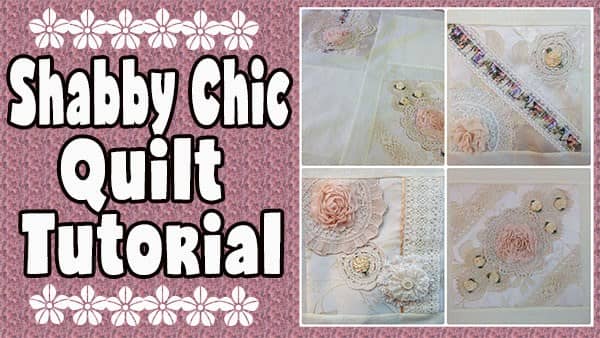
And even though I no longer use the doilies, I didn’t want to dispose of them as both of these wonderful women have passed on, and the doilies bring back such wonderful memories of their talent and their patience.
So I decided to make a quilt from the doilies I had on hand and Paula and I searched for more of these forgotten treasure in the various op-shops around town, to supplement the supply.
Watch the video tutorial below or scroll down for the written instructions
TOOLS USED IN THIS TUTORIAL
You can check the latest prices at Amazon by clicking on the links below:
- Creative Grids Ruler 8½” x 24½”
- Olfa 24″ x 36″ double-sided healing mat
- Olfa 60mm rotary cutter
- Oliso Iron
- Gutermann Sew-All thread
What You Need
Main Fabric
- 10 squares of fabric each measuring 10″ x 10″ – We used damask curtaining fabric as it is heavier than quilting fabric.
Contrasting Fabric
- 10 squares of fabric each measuring 10″ x 10″
Sashing
- Cut 25 strips @ 10″ x 2½”
- Cut 6 strips @ 48″ x 2½”
Backing
- Cut to approx 2″ bigger all round than the quilt top.
Batting
- Cut to approx 2″ bigger all round than the quilt top.
Assortment
- of doilies, laces and other embellishments that you might like to add.
Method
- Take 1 of the 10″ squares and sew on doilies and lace.
- Repeat for 10 more squares.
- What I do is lay the embellishments on the block.
- Just keep rearranging things until they are positioned just as you like them.t
- Take a photo with your phone or iPad.
- Sew the pieces onto the square from the bottom up.
- I machine sewed around the doily to hold it in place.
- Machine sew the lace pieces in place.
- For the square below, I machine sewed the large organza flower and hand stitched the smaller ribbon flowers.
- You could also add pearls and buttons to further enhance your block.
- Leave 10 of the 10″ squares plain.
- Place the squares how you want them to look when the quilt is finished.
- Sew one of the 10″ x 2½” sashing strips to the side of one of the 10″ squares.
- Place the fabric pieces right sides together.
- Sew with a ¼” seam.
- Sew a 10″ x 2½” strip to the outside of the last square in each row.
- Sew the squares, with the sashing pieces attached, together to form a row.
- Lay the squares right sides together.
- Sew with a ¼” seam.
I generally sew the first two squares together and the last two squares together. Then sew both sets together.
- Starting with the top row, sew a 48″ x 2½” sashing strip to the top of each row.
- When you get to the last row, sew a 48″ x 2½” sashing strip onto both the top and the bottom of the last row.
- Join the rows by sewing each row of squares onto the sashing strip of the previous row.
- I added a 6″ border.
- Sew some lace around the border seam. I did try sewing the lace into the seam as I went but this didn’t work out very well. So I opted instead to sew the lace on after I had added the border.
- Cut batting and batting about 2″ larger than the size of your finished quilt top.
- Quilt as desired.
- Bind the quilt.
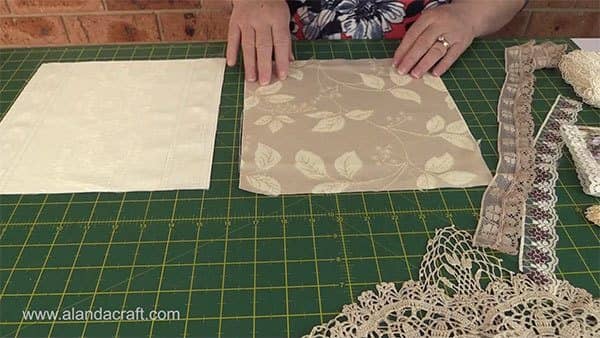
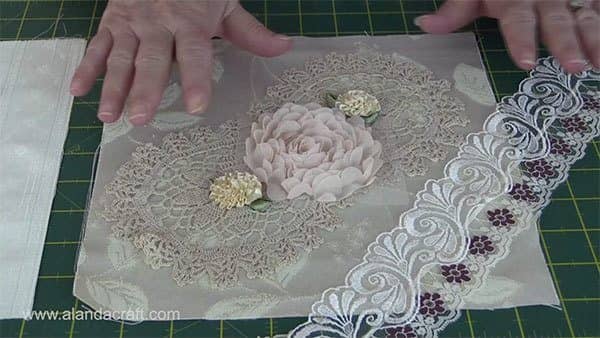
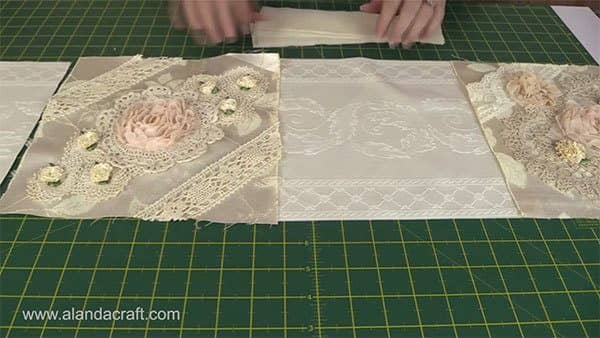
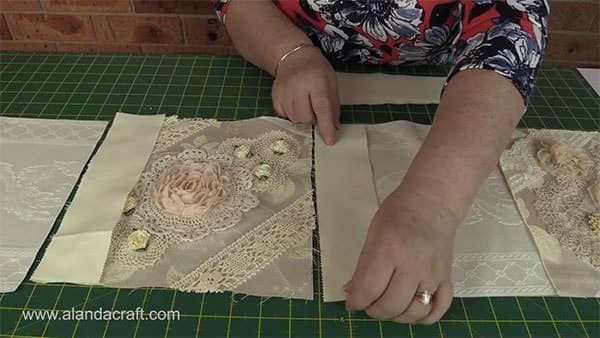
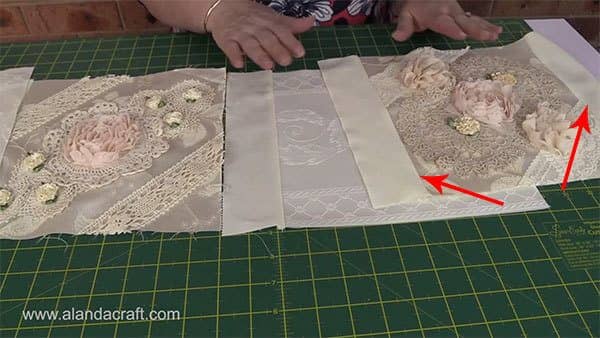
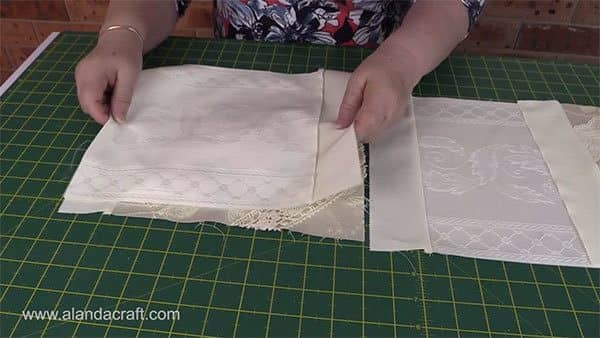
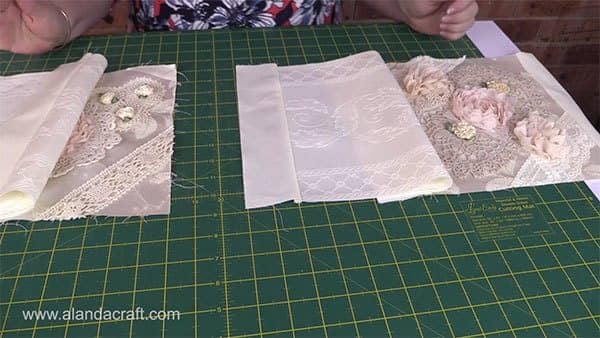

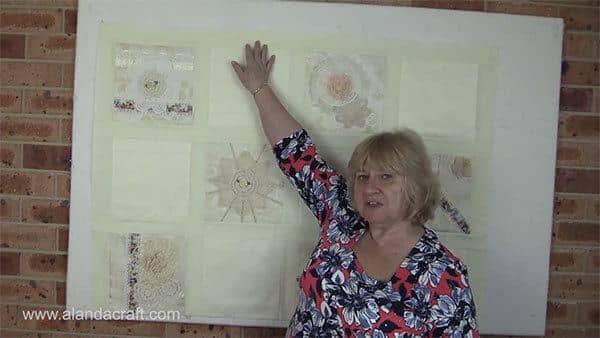
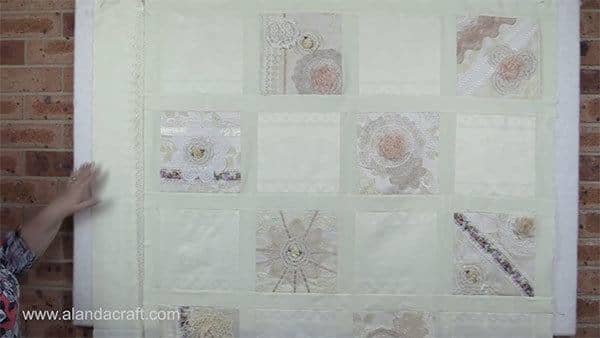



Vonnie says
Hello Amanda. This is so lovely! Can you please share with me how you decided to quilt it when you finished? I have someone who is wanting me to make her something simular to this out of her wedding dress and I think this pattern would be perfect! Thank you for sharing!
Alanda says
I haven’t finished the quilt as yet Vonnie (slack I know). But I’m thinking of just ditch stitching along the sashing and around the blocks. I had thought of stitching 1/4″ on each side of the seam lines, but that would mean stitching over the doilies (which I prefer not to do). I think it’s a lovely idea using the wedding dress and I would love to see photos when you finish it.
Margaret Crossan says
Thank you for your ideas. I have just washed probably 50 or so doilies and can’t bear to dispose of them. My mother’s embroidery is so beautiful, hard to tell back from front. I also have some old damask table cloths from both sides of the family and I will use them to make my blocks. Thank you again. Marg
Alanda Craft says
I just think it’s such a lovely way to remember these talented women, and it’s such a shame to keep their handiwork hidden away in cupboards. It’s amazing the memories that having their handicraft on display,brings back. I’m glad to hear that you like this idea, and I like the idea of using the damask table cloths in your quilt. Enjoy making your project Marg.
Sandy says
Thank you very much for this tutorial. I have a bag full of beautiful doilies and embroidered napkins etc, from my mother-in-law and was wondering what to do with them. A memory quilt is a wonderfu way to showcase this lovely handwork. Thanks again.
Sandy from Canada
Alanda Craft says
I’m glad to hear you like this idea Sandy 😊. I think it’s such a lovely way to remember these talented ladies. Especially now that doilies etc have gone out of fashion. Such a shame really. Our home was always adorned with beautiful doilies – on dressing tables, under vases of fresh flowers etc.